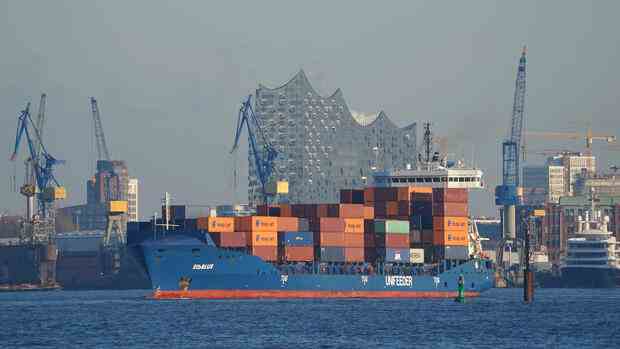There were heated debates just last year when the state-owned Chinese shipping company Cosco wanted to acquire shares in a terminal in the port of Hamburg.
(Photo: dpa)
Berlin The agenda of the German Bundestag shows whether topics are gaining political weight. This Thursday, the MPs will first discuss the government’s skilled labor strategy. Immediately afterwards they discuss the port location for 70 minutes.
The trigger is an application by the CDU/CSU parliamentary group. “The German ports are falling behind in international competition,” said CDU transport politician Christoph Ploß to the Handelsblatt. The man from Hamburg expects the government “to finally tackle problems such as the increasing silt, the urgently needed expansion of hinterland connections or the functionality of the Kiel Canal”.
From the point of view of the opposition, the government should speed things up. In view of the geostrategic developments, the importance of the ports as an energy hub is growing. The federal government must encourage this. Accordingly, the Union faction is calling for more investment in the expansion of the port infrastructure and for the planning and approval procedures to be shortened, as with the liquefied natural gas (LNG) terminals, in view of the overwhelming importance.
Seaports could become energy hubs
The ports have “the potential to become Europe’s leading energy and raw materials hubs,” said transport politician Ploß, who himself comes from Hamburg. “The traffic light coalition must seize this opportunity and ensure that the required infrastructure can be built as quickly as possible.” It should be ensured that LNG, but also hydrogen, can be imported.
Top jobs of the day
Find the best jobs now and
be notified by email.
The traffic light coalition has set itself the goal of developing a new port strategy and increasing “the share of shipping in freight traffic”. The coalition also actually wants to upgrade the infrastructure and expand and renovate locks, for example. However, the money is currently lacking. The government originally wanted to complete the strategy in the summer of 2024. In view of the global developments, however, she now also sees urgency in order to strengthen the “competitiveness and resilience of German sea and inland ports and port companies”, as the Federal Government announced as a goal in a report to the Transport Committee in the summer. “New strategic considerations and solutions” are needed.
>> Also read here: Europe’s imports make LNG scarce and expensive for emerging markets
This also includes the role of ports in energy supply. The ports have “huge potential to become new clean energy centers for integrated electricity systems, hydrogen and other low-carbon fuels and test sites for waste reuse and the circular economy,” says the government report on the planned national port strategy, published by the Handelsblatt present. One of five guidelines should therefore be to “develop the ports into sustainable hubs of the energy transition”.
Most recently, in 2016, the government decided on a port strategy with 155 measures with which it wanted to expand the infrastructure and improve the competitiveness of the ports. For an export nation like Germany, the seaports are the “gateway to the world”, as it is often said.
For the new strategy, five working groups with experts from the industry and officials from the Ministry of Transport met for the first time in November to discuss “guidelines”. According to the plan, the results should be available in the summer and presented at the next maritime conference in mid-September. Part of the strategy should also be to review planned infrastructure projects and implement them more quickly where possible.
The Central Association of German Seaport Companies is also making corresponding demands. “If German industry is to remain competitive in the future, we must start as soon as possible to create the necessary conditions, especially in the ports,” said Managing Director Daniel Hosseus. This is “an elementary part of a strategic energy policy and must not be postponed any longer”. In view of the national importance, the federal government should contribute financially, even if the states are responsible for the ports.
Union: Critical infrastructure needs protection from foreign investors
In addition, the Union faction is asking the government to protect critical port infrastructure from access by foreign investors. To this end, it should adapt foreign trade law and bring about corresponding decisions in Europe. The work plan for the national port strategy does not provide for this so far.
There were heated debates just last year when the state-owned Chinese shipping company Cosco wanted to acquire shares in a terminal in the port of Hamburg. “China must not play the European ports off against each other,” warned Ploß in view of the brisk investment activity of the state-owned company in Europe.
According to the Federal Ministry of Transport, the port economy and the industry dependent on it directly and indirectly employ 5.6 million people. As logistics service providers and growth engines, the companies in the port industry are “of outstanding importance for the entire economy”.
More: Transport Minister Wissing wants to transport more goods by ship – but without a major reform
